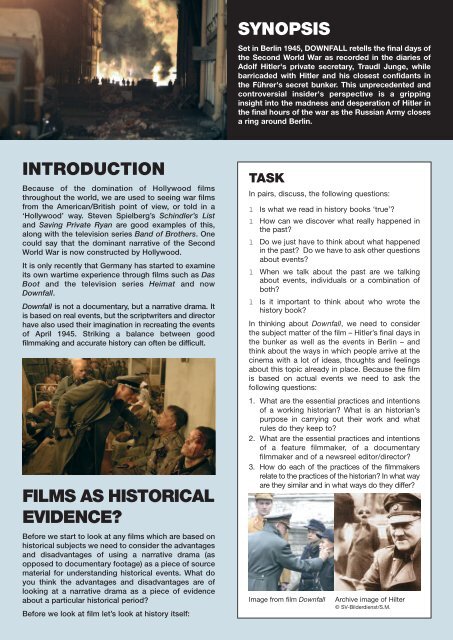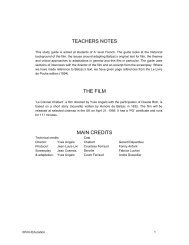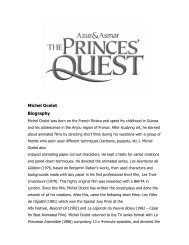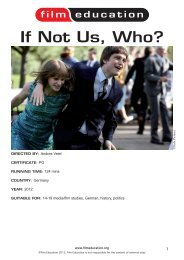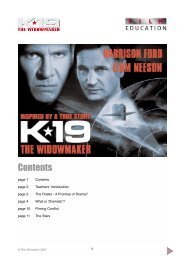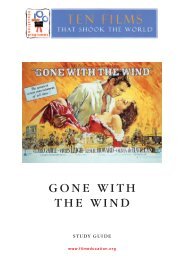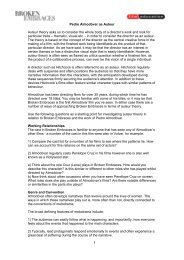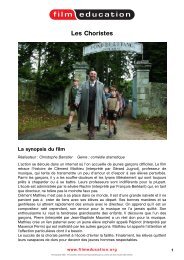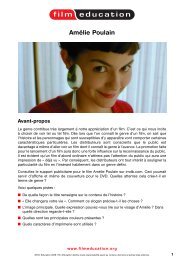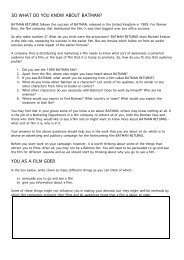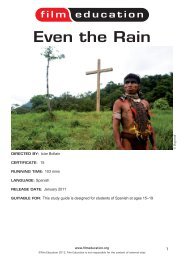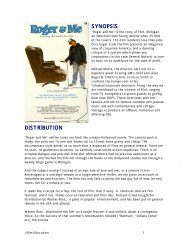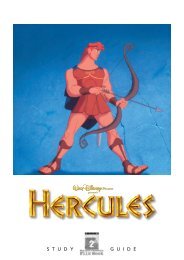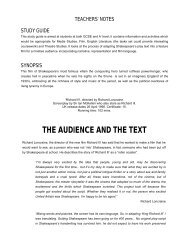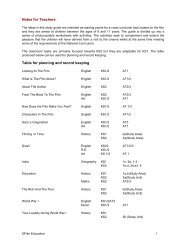Downfall study guide - Film Education
Downfall study guide - Film Education
Downfall study guide - Film Education
You also want an ePaper? Increase the reach of your titles
YUMPU automatically turns print PDFs into web optimized ePapers that Google loves.
INTRODUCTION<br />
Because of the domination of Hollywood films<br />
throughout the world, we are used to seeing war films<br />
from the American/British point of view, or told in a<br />
‘Hollywood’ way. Steven Spielberg’s Schindler’s List<br />
and Saving Private Ryan are good examples of this,<br />
along with the television series Band of Brothers. One<br />
could say that the dominant narrative of the Second<br />
World War is now constructed by Hollywood.<br />
It is only recently that Germany has started to examine<br />
its own wartime experience through films such as Das<br />
Boot and the television series Heimat and now<br />
<strong>Downfall</strong>.<br />
<strong>Downfall</strong> is not a documentary, but a narrative drama. It<br />
is based on real events, but the scriptwriters and director<br />
have also used their imagination in recreating the events<br />
of April 1945. Striking a balance between good<br />
filmmaking and accurate history can often be difficult.<br />
FILMS AS HISTORICAL<br />
EVIDENCE?<br />
Before we start to look at any films which are based on<br />
historical subjects we need to consider the advantages<br />
and disadvantages of using a narrative drama (as<br />
opposed to documentary footage) as a piece of source<br />
material for understanding historical events. What do<br />
you think the advantages and disadvantages are of<br />
looking at a narrative drama as a piece of evidence<br />
about a particular historical period?<br />
Before we look at film let’s look at history itself:<br />
SYNOPSIS<br />
Set in Berlin 1945, DOWNFALL retells the final days of<br />
the Second World War as recorded in the diaries of<br />
Adolf Hitler's private secretary, Traudl Junge, while<br />
barricaded with Hitler and his closest confidants in<br />
the Führer's secret bunker. This unprecedented and<br />
controversial insider's perspective is a gripping<br />
insight into the madness and desperation of Hitler in<br />
the final hours of the war as the Russian Army closes<br />
a ring around Berlin.<br />
TASK<br />
In pairs, discuss, the following questions:<br />
l Is what we read in history books ‘true’?<br />
l How can we discover what really happened in<br />
the past?<br />
l Do we just have to think about what happened<br />
in the past? Do we have to ask other questions<br />
about events?<br />
l When we talk about the past are we talking<br />
about events, individuals or a combination of<br />
both?<br />
l Is it important to think about who wrote the<br />
history book?<br />
In thinking about <strong>Downfall</strong>, we need to consider<br />
the subject matter of the film – Hitler’s final days in<br />
the bunker as well as the events in Berlin – and<br />
think about the ways in which people arrive at the<br />
cinema with a lot of ideas, thoughts and feelings<br />
about this topic already in place. Because the film<br />
is based on actual events we need to ask the<br />
following questions:<br />
1. What are the essential practices and intentions<br />
of a working historian? What is an historian’s<br />
purpose in carrying out their work and what<br />
rules do they keep to?<br />
2. What are the essential practices and intentions<br />
of a feature filmmaker, of a documentary<br />
filmmaker and of a newsreel editor/director?<br />
3. How do each of the practices of the filmmakers<br />
relate to the practices of the historian? In what way<br />
are they similar and in what ways do they differ?<br />
Image from film <strong>Downfall</strong> Archive image of Hilter<br />
© SV-Bilderdienst/S.M.


